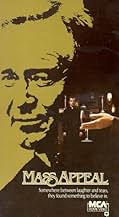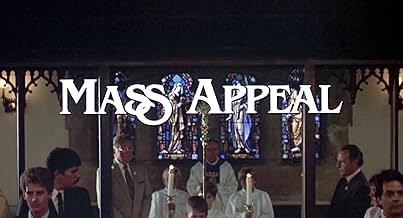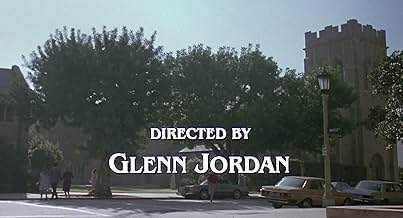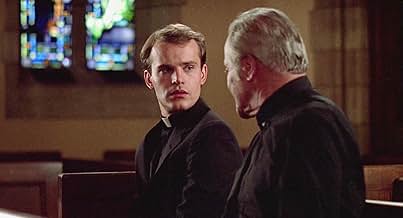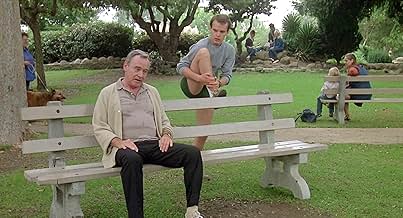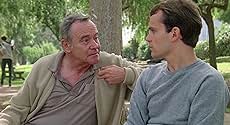VALUTAZIONE IMDb
6,7/10
1184
LA TUA VALUTAZIONE
Aggiungi una trama nella tua linguaA popular Connecticut priest shields a seminary rebel from the wrath of a stern monsignor.A popular Connecticut priest shields a seminary rebel from the wrath of a stern monsignor.A popular Connecticut priest shields a seminary rebel from the wrath of a stern monsignor.
- Premi
- 1 vittoria in totale
Recensioni in evidenza
"Mass Appeal" is enjoyable on several levels. It works as an examination of the depth of contemporary religious beliefs and their current role in our society, as an indictment of an inflexible system (the Catholic church), and as a comment on the travails of two very different men (ostensibly of the same "cloth") seeking spiritual happiness. Unfortunately, as a "mass appeal" film, not all of the issues are satisfactorily handled, but the film is entertaining nonetheless. Greg Cundiff's excellent review neatly summarizes some key plot issues and holes. For example, I found Ivanek's/Dolson's devotion and desire compelling, but what on earth would make him think that a parish of strangers would listen to his excoriations and then embrace him as their pastor? I agree with Cundiff that the lack of clarity surrounding this fundamental plot point does not help the film. I was also disappointed that Durning's character was unambiguously drawn as the heavy. A more balanced approach may have helped here. Farley's attempt at leading a discussion of the role of women priests is unusually framed, but ultimately leaves the viewer desiring a more compelling resolution to the issue.
Strongly on the plus side, Lemmon is an excellent choice for the lead (whi ch allows him to display his comic and dramatic talents equally). Farley's story is as compelling as Dolson's, and Lemmon squeezes every drop of drama from the script. His final "mass appeal" is quite affecting. Ivanek is intense as Dolson, but Charles Durning's role could be played by anyone. The film is nicely "shot" and has an exhilarating soundtrack at points.
A "7" out of "10."
Strongly on the plus side, Lemmon is an excellent choice for the lead (whi ch allows him to display his comic and dramatic talents equally). Farley's story is as compelling as Dolson's, and Lemmon squeezes every drop of drama from the script. His final "mass appeal" is quite affecting. Ivanek is intense as Dolson, but Charles Durning's role could be played by anyone. The film is nicely "shot" and has an exhilarating soundtrack at points.
A "7" out of "10."
Father Farley drinks a little. He also goes to the races, is bad with first names, and tells "little lies" to get him out of tricky situations, like those involving domestic quarrels and slideshows with Monsignor Burke. But his parish loves him. Then he is assigned to look after a passionate young deacon who challenges him to step out of his blissful rut.
Jack Lemmon gives a very lived-in, often moving performance as Father Farley, and the best moments of "Mass Appeal" give us a chance to see Lemmon in his seriocomic element. But the film as a whole feels less smooth. Though it raises questions about saying what one believes versus being popular, "Mass Appeal" struggles to find a balance of its own, whether it wants to be a Neil Simon-style light comedy or a searing examination of the Catholic Church today.
Still, "Mass Appeal" is more good than not. It deals knowingly with the concepts of Catholicism, and hones in on the charms and pitfalls of the parochial life with small-bore detail. "Did I tell you about the coughs?" Father Farley tells the deacon, Mark Dolson (Zeljko Ivanek), cluing him in on one of the telltale signs a sermon-giver is losing his congregation. When giving a sermon, never say "you," always say "we." Less confrontational that way.
The problem is that Dolson is all about confrontation. He already has Monsignor Burke (Charles Durning) fuming about being called a "homophobic autocrat" for kicking out a pair of seminarians suspected of sleeping together. Dolson speaks in favor of the ordination of women, tells Farley he'd be a better priest if he drank less, and calls out the congregation during one sermon for their mink hats and blue hair.
Farley squirms from his seat behind the altar while his acolyte implodes in the pulpit, ignoring his hacking throng. "We'll be going out the back today," he mutters to an altar boy in a classic Lemmon aside.
My main problem with "Mass Appeal," as noted by other posters, was that I was never sold on Dolson's reason for becoming a priest. He seems more like a mouthpiece for Bill C. Davis, adapting his Broadway play, to vocalize his concerns about the church's position on wedge issues like celibate gays in the clergy. Ivanek plays him as a character who acts more from anger than conviction, which seems a wrong choice. You don't have to be an autocratic homophobe to think this guy, celibate or not, will have problems with his priestly office somewhere down the road.
There's a frostiness to Ivanek's scenes with Lemmon that's off-putting, and the sentiment squeezed out of them sometimes feels stagey and forced. Director Glenn Jordan worked mostly in TV movies, and while he frames his scenes well and builds a good pace, there's often a pedestrian quality to the overall presentation. You can't stick in a car chase with a film like this, but there are too many talking-head shots.
The best parts of the movie are Lemmon's scenes with Monsignor Burke, which Durning invests with his typical mix of menace and affability. Not just a heavy, Durning plays him as a bit lost. Burke really likes Farley but alienates him at the same time with his bullying, as subservience is the only kind of devotion this sacerdotal relic understands. When Dolson calls him out on his harshness, Burke targets him for his frankness and justifies his vendetta as churchly devotion.
One wishes Davis made Burke more than the bad guy, perhaps found a way to make him a more active player in the spiritual journeys of Farley and Dolson, journeys left largely unexplored here. Instead he's made the object of anger for the other characters, and even has a wormy henchman on call. Didn't Burke have his days as a lost seminarian, too?
"Mass Appeal" gets by with its light charm, its probing and atypical focus on the Catholic faith in practice, and most especially Lemmon's strong central performance. Even if you don't like Lemmon in every film of his you see, it's safe to say you will like him here. Sometimes it takes a lesser film to display a great actor, and that's what you get here.
Jack Lemmon gives a very lived-in, often moving performance as Father Farley, and the best moments of "Mass Appeal" give us a chance to see Lemmon in his seriocomic element. But the film as a whole feels less smooth. Though it raises questions about saying what one believes versus being popular, "Mass Appeal" struggles to find a balance of its own, whether it wants to be a Neil Simon-style light comedy or a searing examination of the Catholic Church today.
Still, "Mass Appeal" is more good than not. It deals knowingly with the concepts of Catholicism, and hones in on the charms and pitfalls of the parochial life with small-bore detail. "Did I tell you about the coughs?" Father Farley tells the deacon, Mark Dolson (Zeljko Ivanek), cluing him in on one of the telltale signs a sermon-giver is losing his congregation. When giving a sermon, never say "you," always say "we." Less confrontational that way.
The problem is that Dolson is all about confrontation. He already has Monsignor Burke (Charles Durning) fuming about being called a "homophobic autocrat" for kicking out a pair of seminarians suspected of sleeping together. Dolson speaks in favor of the ordination of women, tells Farley he'd be a better priest if he drank less, and calls out the congregation during one sermon for their mink hats and blue hair.
Farley squirms from his seat behind the altar while his acolyte implodes in the pulpit, ignoring his hacking throng. "We'll be going out the back today," he mutters to an altar boy in a classic Lemmon aside.
My main problem with "Mass Appeal," as noted by other posters, was that I was never sold on Dolson's reason for becoming a priest. He seems more like a mouthpiece for Bill C. Davis, adapting his Broadway play, to vocalize his concerns about the church's position on wedge issues like celibate gays in the clergy. Ivanek plays him as a character who acts more from anger than conviction, which seems a wrong choice. You don't have to be an autocratic homophobe to think this guy, celibate or not, will have problems with his priestly office somewhere down the road.
There's a frostiness to Ivanek's scenes with Lemmon that's off-putting, and the sentiment squeezed out of them sometimes feels stagey and forced. Director Glenn Jordan worked mostly in TV movies, and while he frames his scenes well and builds a good pace, there's often a pedestrian quality to the overall presentation. You can't stick in a car chase with a film like this, but there are too many talking-head shots.
The best parts of the movie are Lemmon's scenes with Monsignor Burke, which Durning invests with his typical mix of menace and affability. Not just a heavy, Durning plays him as a bit lost. Burke really likes Farley but alienates him at the same time with his bullying, as subservience is the only kind of devotion this sacerdotal relic understands. When Dolson calls him out on his harshness, Burke targets him for his frankness and justifies his vendetta as churchly devotion.
One wishes Davis made Burke more than the bad guy, perhaps found a way to make him a more active player in the spiritual journeys of Farley and Dolson, journeys left largely unexplored here. Instead he's made the object of anger for the other characters, and even has a wormy henchman on call. Didn't Burke have his days as a lost seminarian, too?
"Mass Appeal" gets by with its light charm, its probing and atypical focus on the Catholic faith in practice, and most especially Lemmon's strong central performance. Even if you don't like Lemmon in every film of his you see, it's safe to say you will like him here. Sometimes it takes a lesser film to display a great actor, and that's what you get here.
The best part of this movie is the performance by Jack Lemmon as Father Farley, the aging and very comfortable (indeed, far too comfortable) priest of a Roman Catholic parish. Farley is loved by his people - and he loves being loved. He loves the people in return, but more than that - he needs the people; he needs the sense of belonging that he gains from them; the sense of identity he gets from them. He can't bear the thought of losing them, which ironically makes him less effective as their priest. He has a friendly but sometimes strained relationship with the local monsignor (played by Charles Durning) - a relationship pushed to the breaking point when the monsignor assigns a young seminarian, Mark Dolson (Zeljko Ivanec) to Farley's parish as a deacon. The monsignor doesn't like Dolson. He's under suspicion for his too quick defence of two fellow seminarians expelled because it was believed that they were gay. After defending Dolson, Farley is given the responsibility of turning Dolson into a "real" candidate for the priesthood in a month.
I think people misunderstand this movie. It's easy to think that this is about the struggles of being gay and a priest in the Catholic Church. But that's not what this is about at all - at least not to me. This was really about Farley, and his struggles with his own identity - not sexual, but his waning sense of vocation and his desire just to keep people happy and not make waves. His priesthood is being lived out in a cloak of fear that something might go wrong; that his parish might get upset with him; that the monsignor might transfer him. He lacks joy, purpose and fulfilment in his vocation. Lemmon captured that. In a neat trick of camera-work, there was a wonderful shot of Father Farley in the pulpit, in full clerical dress, standing before his congregation - and he looked so small, so vulnerable and even so unimportant. That's what Farley had become.
This was the point of the movie - not Dolson. Dolson pushed Farley. In a strange sort of way, even though he was a pain in Farley's neck, he encouraged Farley; he ultimately enlivened Farley and helped Farley regain that sense of purpose in his vocation as he finally works up the courage to take on the monsignor and make himself vulnerable to his parish by appealing to them to support Dolson. I thought this was very well done.
Durning as the monsignor was also significant. His character pointed out every well the problems of an overly hierarchical and authoritarian ecclesiastical structure. Decisions could get made and people's entire vocations and futures decided at his whim, without any evidence to back up his suspicions. The monsignor was a threatening character; a very dark character which Durning pulled off well.
Keep in mind that this movie is almost 30 years old. It doesn't address any of the current scandals in the Roman Catholic Church because they just weren't out there publicly in 1984. It deals with one priest's failing calling, and one seminarian's attempt to determine if he has a calling. Basically, this was extremely well done on everyone's part. It's one of the better "church" movies I've ever seen. 8/10
I think people misunderstand this movie. It's easy to think that this is about the struggles of being gay and a priest in the Catholic Church. But that's not what this is about at all - at least not to me. This was really about Farley, and his struggles with his own identity - not sexual, but his waning sense of vocation and his desire just to keep people happy and not make waves. His priesthood is being lived out in a cloak of fear that something might go wrong; that his parish might get upset with him; that the monsignor might transfer him. He lacks joy, purpose and fulfilment in his vocation. Lemmon captured that. In a neat trick of camera-work, there was a wonderful shot of Father Farley in the pulpit, in full clerical dress, standing before his congregation - and he looked so small, so vulnerable and even so unimportant. That's what Farley had become.
This was the point of the movie - not Dolson. Dolson pushed Farley. In a strange sort of way, even though he was a pain in Farley's neck, he encouraged Farley; he ultimately enlivened Farley and helped Farley regain that sense of purpose in his vocation as he finally works up the courage to take on the monsignor and make himself vulnerable to his parish by appealing to them to support Dolson. I thought this was very well done.
Durning as the monsignor was also significant. His character pointed out every well the problems of an overly hierarchical and authoritarian ecclesiastical structure. Decisions could get made and people's entire vocations and futures decided at his whim, without any evidence to back up his suspicions. The monsignor was a threatening character; a very dark character which Durning pulled off well.
Keep in mind that this movie is almost 30 years old. It doesn't address any of the current scandals in the Roman Catholic Church because they just weren't out there publicly in 1984. It deals with one priest's failing calling, and one seminarian's attempt to determine if he has a calling. Basically, this was extremely well done on everyone's part. It's one of the better "church" movies I've ever seen. 8/10
Jack Lemmon shines as Father Farley, a spineless priest who'll say anything to anyone if it makes his life easier. Through a series of circumstances, he has to face himself as a result of being "assigned" Mark Dolson as a deacon.
When I first watched this movie, I was disappointed by the ending, because it didn't seem to resolve the main issue (which concerns Mark Dolson). But eventually I realized that it issue was Father Farley, and his spinelessness, and Mark Dolson was merely the means by which Farley is brought to terms with himself.
My second favorite movie of all time.
When I first watched this movie, I was disappointed by the ending, because it didn't seem to resolve the main issue (which concerns Mark Dolson). But eventually I realized that it issue was Father Farley, and his spinelessness, and Mark Dolson was merely the means by which Farley is brought to terms with himself.
My second favorite movie of all time.
Last night we showed `Mass Appeal' at our parish's monthly Movie Night - REEL Conversations. There was a mixed reaction from the viewers and some lively discussion afterwards.
Some questioned why Hollywood has trouble portraying Catholics (priests, monsignors, laity) in a positive light. We had difficulty coming up with a movie that showed a believer acting like a true believer. In this film, for example, in times of crisis or need, the characters don't turn to prayer for God's help. Seemed odd.
We very much enjoyed the dialog between the mentor priest and young seminarian. It was interesting to see the roles of the two alternate throughout the movie. Plenty of still-pertinent topics they covered (authority of the church, power, homosexuality, celibacy, sin, being lukewarm in one's faith) with some very interesting outcomes.
All in all, an enjoyable film with moments of great humor and warm sentiment. A fine choice for a group discussion. One that challenges your faith and is encouraging to those who believe.
Some questioned why Hollywood has trouble portraying Catholics (priests, monsignors, laity) in a positive light. We had difficulty coming up with a movie that showed a believer acting like a true believer. In this film, for example, in times of crisis or need, the characters don't turn to prayer for God's help. Seemed odd.
We very much enjoyed the dialog between the mentor priest and young seminarian. It was interesting to see the roles of the two alternate throughout the movie. Plenty of still-pertinent topics they covered (authority of the church, power, homosexuality, celibacy, sin, being lukewarm in one's faith) with some very interesting outcomes.
All in all, an enjoyable film with moments of great humor and warm sentiment. A fine choice for a group discussion. One that challenges your faith and is encouraging to those who believe.
Lo sapevi?
- QuizAccording to actor Zeljko Ivanek, the fish sermon scene was shot 15 times from three different angles. Although Ivanek considers the last take the best, most of it didn't make the final cut because it was too emotionally jarring for the audience.
- Citazioni
Father Tim Farley: You're a lunatic! And Christ NEEDS lunatics. But the trouble with lunatics is, they don't know how to survive.
- Curiosità sui creditiThis picture is dedicated to the memory of Ray A. Kroc.
- ConnessioniFeatured in At the Movies: Dune/Starman/Mass Appeal/Runaway (1984)
I più visti
Accedi per valutare e creare un elenco di titoli salvati per ottenere consigli personalizzati
- How long is Mass Appeal?Powered by Alexa
Dettagli
- Data di uscita
- Paese di origine
- Lingua
- Celebre anche come
- Die Auseinandersetzung
- Luoghi delle riprese
- Claremont, California, Stati Uniti(myself, as I was an extra in this film)
- Aziende produttrici
- Vedi altri crediti dell’azienda su IMDbPro
Botteghino
- Budget
- 7.000.000 USD (previsto)
- Lordo Stati Uniti e Canada
- 1.945.658 USD
- Lordo in tutto il mondo
- 1.945.658 USD
Contribuisci a questa pagina
Suggerisci una modifica o aggiungi i contenuti mancanti

Divario superiore
By what name was Mass Appeal (1984) officially released in Canada in English?
Rispondi

